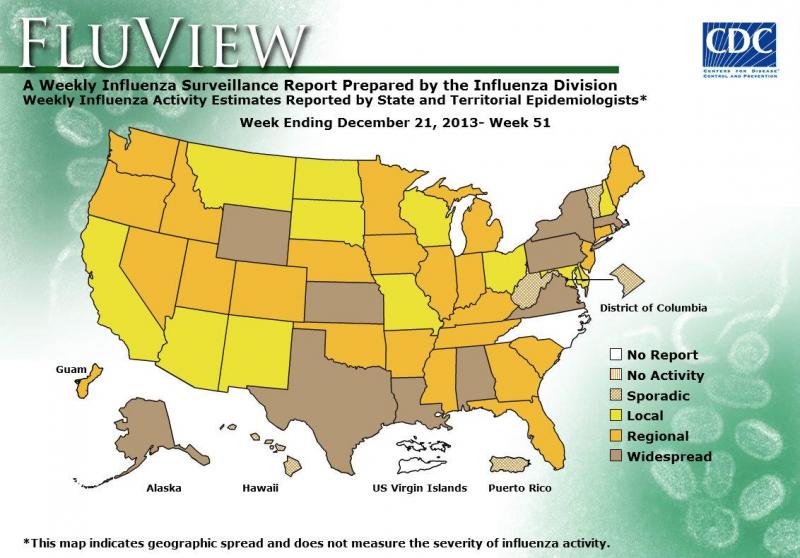The flu, with all its associated misery, has been filtering into Maine since November, prompting the Maine Center for Disease Control and Prevention to issue an advisory Dec. 26 to school nurses, public health departments and county emergency management agencies. Early reports indicate the strain is Influenza A i(H1N1) pdm09 (pH1N1) virus and is attributed to a number of severe respiratory illnesses among young and middle-aged adults.
Anecdotally, more conversations in the Midcoast have referenced “the flu,” with symptoms ranging from a bad cough, to fever to upset stomachs.
A number of patients have been hospitalized across Maine and a few have died from influenza and pneumonia, according to the Maine CDC.
“Multiple pH1N1-associated hospitalizations, including many requiring intensive care unit admission, and some fatalities have been reported,” the CDC’s Dec. 26 advisory said.
The vaccine against this virus is still widely available through providers, pharmacies, public clinics, and some schools, the CDC said, recommending an annual influenza vaccination for everyone six months and older.
“The pH1N1 virus that emerged in 2009 caused more illness in children and young adults, compared to older adults, although severe illness was seen in all age groups,” wrote the Maine CDC in its advisory. “While it is not possible to predict which influenza viruses will predominate during the entire 2013-14 influenza season, pH1N1 has been the predominant circulating virus so far. For the 2013-14 season, if pH1N1 virus continues to circulate widely, illness that disproportionately affects young and middle-aged adults may occur.”
The majority of flu cases have been reported in Penobscot, Cumberland, York and Aroostook counties, according to the last set of results collected by the Maine CDC.
“Anyone who has not yet been vaccinated this season should get an influenza vaccine now,” the CDC said. “While annual vaccination is the best tool for prevention of influenza and its complications, treatment with antiviral drugs (oral oseltamivir and inhaled zanamivir) is an important second line of defense for those who become ill to reduce morbidity and mortality.
Influenza activity is expected to increase during the next few weeks. Health officials have observed that some infected with this flu strain have experienced severe illness.
“While most of these people with severe illness have had risk factors for influenza-associated complications, including pregnancy and morbid obesity, several have not,” the health agency said.
Prevention and Treatment, from the CDC
Take everyday preventive measures against the flu:
Wash hands frequently with soap and water, but especially after coughing and sneezing. Alcohol-based hand gels can also be used.
Avoid touching the nose, mouth, and eyes. Germs can spread this way.
Get vaccinated against the flu. To find locations where vaccine is available, contact a health care provider or pharmacy, call 211, or visit www.211maine.org or www.flu.gov
Consult a health care provider about getting a pneumococcal vaccine for anyone who is younger than five, between ages five and 64 with high risk conditions, or age 65 and older.
Avoid contact with sick people. If at very high risk for complications, avoid large crowds.
Have the flu?
Stay home until fever-free for a full 24 hours without taking fever-reducing medicine.
Cough and sneeze into elbow or into a tissue. Throw the tissue away.
Although most people can stay home to recover without seeing a health care provider, it is possible for healthy people to develop severe illness from the flu. Anyone with the flu should seek medical attention for:
- Dehydration
- Trouble breathing
- Getting better, then suddenly getting a lot worse
- Any major change in condition
For more information
Summary of Weekly U.S. Influenza Surveillance Report
People at High Risk of Developing Flu–Related Complications
Clinical Signs and Symptoms of Influenza
Reach Editorial Director Lynda Clancy at lyndaclancy@penbaypilot.com; 207-706-6657
Patient Education: Influenza Brochures, Fact Sheets, and Posters



























